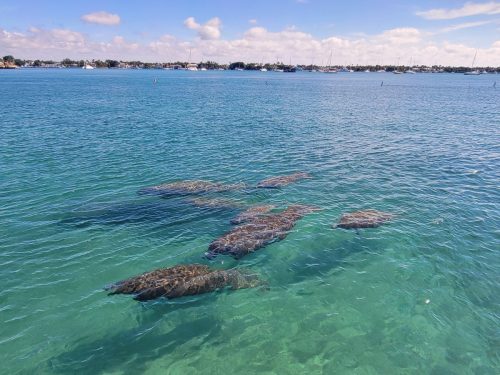If You See This at the Beach, "Don't Touch" It, Police Say in New Warning
Authorities say doing this is both dangerous and illegal.

The remaining weeks of warm weather are slowly dwindling for people across the country, which means there's no time like the present to indulge in one of the most beloved summer activities: going to the beach. People in the U.S. make more than 400 million visits to the beach every single year, according to the National Lifesaving Association. But from rip currents to hungry sharks, there are a number of risks attached to this go-to summer outing. Now, police are warning people to stay away from one thing they might encounter at the beach. Read on to learn what you should keep your distance from.
READ THIS NEXT: If You See This at the Beach, Don't Go in the Water, Experts Warn.
Beachgoers have been warned about various dangers already this summer.

It's been a hot one this summer, so it's no surprise that many Americans have been making their way to the water. Unfortunately, it's been a somewhat riskier season than usual.
Last month, police in Springfield, Missouri, started warning residents not to swim in places without supervision amid an ongoing national shortage of lifeguards—calling the risk "extremely dangerous" as a number of cities across the U.S. have already experienced fatal drownings without lifeguards present this summer.
Also in July, officials in Suffolk County, New York, alerted residents about a significant increase in shark attacks this year, saying that the trend is likely part of a "new normal."
But if you live in another part of the country, you need to be careful around another hazard you might encounter on your next beach trip.
Police are alerting beachgoers to be on the lookout for something else.

Authorities in Florida are asking those at beaches in the state to keep an eye out for one thing near the water: mating manatees.
On Aug. 7, the Sarasota Police Department took to Facebook to warn beachgoers against approaching the sea creatures after "quite a few folks" were spotted trying to touch several manatees mating near South Lido Beach. "If you see a manatee mating herd, observe respectfully from a distance," the department wrote. "Do not touch."
RELATED: For more up-to-date information, sign up for our daily newsletter.
It's dangerous for you to approach mating manatees.

The Sarasota Police Department said that touching a mating manatee is actually "dangerous to both you and the animal." The Florida Fish and Wildlife Conservation Commission (FWC) says that mating season starts in April and peaks in early fall—so it's currently in full swing, according to the Miami Herald.
"It's common to see a mating manatee herd in shallow, nearshore Florida waters during the spring and summer months," the FWC wrote on a Facebook post. "If you encounter a herd, it's important to watch from a distance as these large, strong animals are focused on mating. Bystanders that get too close could be seriously injured."
It's also dangerous for the animals themselves. "Look, but don't touch manatees. Also, don't feed manatees or give them water," the FWC warns on their website. "If manatees become accustomed to being around people, they can alter their behavior in the wild, perhaps causing them to lose their natural fear of boats and humans, which may make them more susceptible to harm."
But it's also illegal to do so.

These at-risk sea creatures are protected by state and federal law—making it not only a dangerous act to touch a mating manatee, but an illegal one, the Sarasota Police Department warned. According to the FWC, it's illegal under the the Florida Manatee Sanctuary Act of 1978 to feed, harass, harm, pursue, hunt, shoot, wound, kill, annoy, or molest manatees, and violations can range anywhere from up to $500 in fines and 60 days in prison at the state level to up to $100,000 in fines and a year in prison at the federal level.
The FWC reported a record high number of manatee deaths last year, with 1,101 confirmed deaths in 2021, CBS-affiliate WTSP in St. Petersburg, Florida, reported on Aug. 8. So far, there have been 653 manatee deaths reported this year, which is hundreds of deaths above what has been reported in previous years.





















